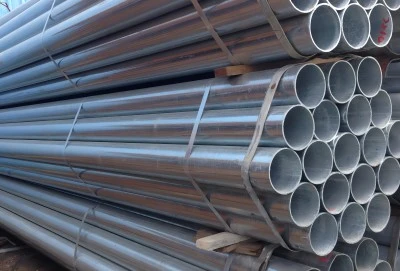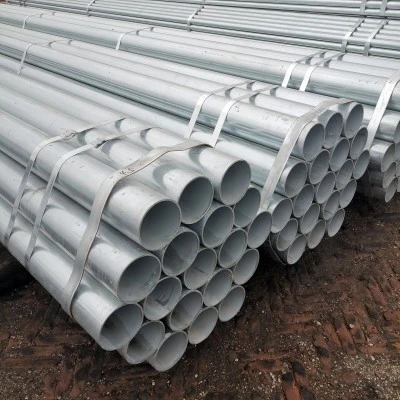Galvanized pipe is a type of steel pipe that has been coated with a protective layer of zinc to enhance its durability and corrosion resistance. This zinc coating is applied through a process called galvanization, which involves immersing the steel pipe in molten zinc. The result is a robust and long-lasting pipe that can withstand harsh environments and is widely used in various industries, including construction, plumbing, and oil and gas transportation.
|
|
|
The Science Behind Zinc Coating
Hot-dip galvanization process explained
The hot-dip galvanization process is a crucial step in creating galvanized pipes. This method involves immersing clean steel pipes into a bath of molten zinc at temperatures around 450°C (842°F). As the steel comes into contact with the zinc, a series of metallurgical reactions occur, forming a tightly bonded coating.
The process begins with surface preparation, where the steel pipes are cleaned thoroughly to remove any rust, oil, or other contaminants. This is typically done through acid pickling or abrasive cleaning. Once clean, the pipes are fluxed to prevent oxidation and ensure proper adhesion of the zinc coating.
After preparation, the pipes are dipped into the molten zinc bath. The duration of immersion varies depending on the thickness of the steel and the desired coating thickness. During this time, the zinc reacts with the iron in the steel to form a series of zinc-iron alloy layers.
Chemical reactions in zinc coating formation
The chemical reactions that occur during the galvanization process are complex and fascinating. When the steel pipe comes into contact with the molten zinc, several distinct layers form:
- Gamma Layer: This is the innermost layer, consisting of a zinc-iron alloy with about 75% zinc.
- Delta Layer: The next layer is another zinc-iron alloy, containing about 90% zinc.
- Zeta Layer: This layer is composed of a zinc-iron alloy with approximately 94% zinc.
- Eta Layer: The outermost layer is pure zinc.
These layers are metallurgically bonded to the steel substrate, creating a strong and durable coating that protects the pipe from corrosion.
Factors affecting galvanized pipe durability
Several factors influence the durability and performance of galvanized pipes:
- Coating Thickness: A thicker zinc coating generally provides better protection and longer service life.
- Environmental Conditions: The pH of the surrounding environment significantly affects the corrosion rate of the zinc coating.
- Temperature: Higher temperatures can accelerate the corrosion process.
- Mechanical Damage: Scratches or dents in the coating can compromise its protective qualities.
- Steel Composition: The chemical makeup of the base steel can influence the galvanization process and the resulting coating quality.
Understanding these factors is crucial for engineers and project managers when selecting and implementing galvanized pipes in various applications.
Advantages of Galvanized Pipes
Superior corrosion resistance in harsh environmentsOne of the primary benefits of galvanized pipes is their exceptional corrosion resistance, particularly in challenging environments. The zinc coating acts as a sacrificial anode, corroding preferentially to protect the underlying steel. This mechanism, known as cathodic protection, significantly extends the life of the pipe.
In coastal areas, where salt spray is a constant threat to metal structures, galvanized pipes show remarkable resilience. They also perform well in industrial settings where exposure to chemicals and pollutants is common. For offshore platforms and marine applications, galvanized pipes are often the material of choice due to their ability to withstand the corrosive effects of seawater.
The corrosion resistance of galvanized pipes is not limited to external factors. They also protect against internal corrosion, making them suitable for transporting various fluids, including water, oil, and gas. This dual protection ensures the integrity of the pipe and the purity of the transported materials.
Cost-effective alternative to stainless steel
When comparing galvanized pipes to stainless steel, the cost advantage becomes apparent. While stainless steel offers excellent corrosion resistance, it comes at a premium price. They provide a more economical solution without significantly compromising on performance in many applications.
The initial cost of galvanized pipes is considerably lower than that of stainless steel. This cost difference can lead to substantial savings, especially in large-scale projects such as water supply systems or industrial plant construction. For project procurement managers and plant equipment managers, this presents an opportunity to optimize budgets without sacrificing quality or safety.
Moreover, the long-term cost benefits are noteworthy. Their durability and low maintenance requirements translate to reduced replacement and repair costs over the lifespan of the installation. This aspect is particularly valuable in remote or hard-to-access locations where maintenance operations can be challenging and expensive.
Extended lifespan and low maintenance requirements
Galvanized pipes boast an impressive lifespan, often exceeding 50 years in many applications. This longevity is a key factor in their popularity among structural engineers and project managers who prioritize long-term reliability and performance.
The low maintenance requirements contribute significantly to their cost-effectiveness. Unlike some other materials that may require regular painting or protective treatments, galvanized pipes maintain their protective qualities with minimal intervention. This characteristic is particularly valuable in large-scale industrial settings or extensive pipeline networks where maintenance operations can be logistically challenging and costly.
In the event of minor damage to the zinc coating, galvanized pipes have a self-healing property. The surrounding zinc can migrate to cover small scratches or exposed areas, maintaining the protective barrier. This self-repairing ability further reduces the need for manual maintenance and ensures continued protection against corrosion.
Common Applications in Construction
Water supply systems and plumbing installationsGalvanized pipes have long been a staple in water supply systems and plumbing installations. Their corrosion resistance and durability make them an excellent choice for transporting potable water over long distances. In municipal water systems, these pipes are often used for main lines and distribution networks, ensuring clean water delivery to homes and businesses.
In industrial settings, galvanized pipes are frequently employed for process water systems, cooling towers, and fire protection sprinkler systems. Their ability to withstand high pressures and resist internal corrosion makes them ideal for these critical applications. Plant equipment managers appreciate the reliability and low maintenance requirements of galvanized pipes in these contexts.
For offshore platforms and marine vessels, these pipes are crucial components of seawater cooling systems and ballast water management. Their resistance to both internal and external corrosion in saline environments ensures the longevity and efficiency of these vital systems.
Structural support in building frameworks
In the realm of structural engineering, galvanized pipes play a significant role in building frameworks. Their high strength-to-weight ratio and corrosion resistance make them an attractive option for both temporary and permanent structures. Scaffolding systems, for instance, often utilize galvanized pipes due to their durability and ability to withstand repeated assembly and disassembly.
In steel-framed buildings, galvanized pipes are frequently used as secondary structural members, such as purlins and girts. These components support roof and wall cladding while providing additional stability to the primary structure. The corrosion protection offered by galvanization is particularly valuable in industrial buildings or structures exposed to harsh environmental conditions.
Bridge construction also benefits from the use. They are often employed in handrails, safety barriers, and even as conduits for electrical and communication cables. The long-term durability reduces maintenance costs and enhances the overall lifespan of these critical infrastructure elements.
Fencing and outdoor structures for longevity
The outdoor applications are numerous and diverse. In fencing solutions, galvanized pipes form the backbone of many designs, from simple chain-link fences to more elaborate security perimeters. Their resistance to weathering and corrosion ensures that these fences maintain their structural integrity and appearance for many years, even in challenging climates.
Agricultural applications also make extensive use of galvanized pipes. Irrigation systems, greenhouse structures, and livestock handling facilities all benefit from the durability and corrosion resistance of these pipes. In these settings, these pipes can withstand exposure to various chemicals, animal waste, and constant moisture without degrading.
Outdoor recreational facilities frequently incorporate galvanized pipes in their designs. Playground equipment, sports field structures, and park amenities often feature galvanized components due to their ability to withstand constant use and exposure to the elements. This application highlights the versatility of galvanized pipes in creating safe and long-lasting outdoor structures.
Where to Buy Galvanized Pipes?
When it comes to sourcing high-quality pipes for your projects, Hebei Longma Group stands out as a premier manufacturer and supplier. Our state-of-the-art production facilities, which include equipment imported from Germany and four independently developed production lines, ensure consistently superior products. With a team of over 300 employees, including more than 60 technical experts, we bring unparalleled expertise to every pipe we produce.
Quality assurance is at the heart of our operations. Our comprehensive testing facilities, featuring online ultrasonic automatic flaw detectors and industrial X-ray television, guarantee that every pipe meets the highest standards. We pride ourselves on fast delivery, with the ability to complete production of standard thickness steel pipes in as little as 7 days.
Our certifications, including API 5L, ISO 9001, ISO 14001, and FPC, demonstrate our commitment to quality and environmental responsibility. Thanks to our long-term partnerships with raw material suppliers and our integrated production model, we offer competitive pricing without compromising on quality.
To learn more about our pipe offerings or to place an order, contact us at info@longma-group.com. Our team is ready to assist you with your galvanized pipe needs, ensuring you receive the best products for your projects.














